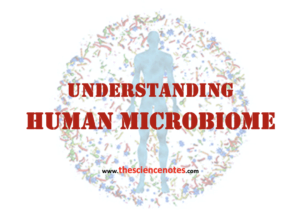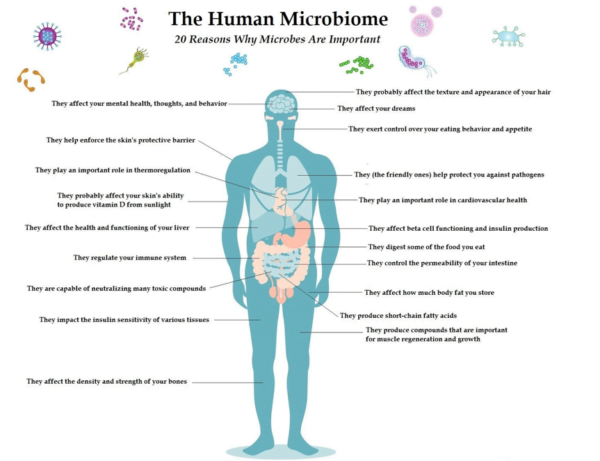Inside our bodies, there’s a hidden world called the human microbiome. It’s like a bustling community of tiny living things that we can’t see without special tools. This microbiome is super important because it affects our health in amazing ways. It helps us fight off illnesses, digest food, keep our minds feeling good, and even control our weight. In this article, we’re going to explore this fascinating world of the human microbiome. We’ll uncover its secrets and learn why it’s so incredibly important for us.

What is the Human Microbiome?
The human microbiome refers to the vast collection of microorganisms – bacteria, archaea, fungi, protists, and viruses – that call our body home. These microorganisms exist in harmonious coexistence with our cells, inhabiting various parts of our body such as the skin, mouth, gut, and even deeper within our digestive tract. This complex ecosystem, often likened to a second genome, holds the key to many aspects of our well-being.
Diversity and Composition of the Human Microbiome
The human microbiome is not a homogenous entity but a mosaic of microbial communities, each with its own unique composition and role. From the depths of the gastrointestinal tract to the intricate folds of the skin, these microbial communities vary in species richness and abundance. Noteworthy among them are:

- The Vaginal Microbiome: This unique ecosystem plays a vital role in maintaining vaginal health and preventing infections. Lactobacillus species, for instance, produce lactic acid, creating an acidic environment that hinders the growth of harmful microbes.
- The Skin Microbiota: A diverse array of microorganisms resides on our skin, contributing to skin health, immune responses, and protection against pathogens. Staphylococcus, Streptococcus, and Propionibacterium are some of the common residents.
- The Eye Microbiota: While research on the eye microbiota is still in its infancy, studies suggest that it may play a role in protecting against infections and maintaining ocular health.
- The Ear Microbiota: The delicate balance within our ears is influenced by a unique set of microorganisms. These microbes contribute to auditory health and protection against pathogens.
- The Microbiota of the Nasopharyngeal Tract: This community impacts respiratory health and immune responses. The presence of diverse bacteria in this region can influence susceptibility to respiratory infections.
- The Oral Microbiota: The bustling community in our mouths not only affects oral health but also influences systemic health. Streptococcus, Actinomyces, and Porphyromonas are some of the common inhabitants.
- The Microbiota of the Gastrointestinal Tract: This extensive network encompasses the stomach, intestines, and cecum. It profoundly affects digestion, nutrient absorption, and overall immune function. Bacteroides, Firmicutes, and Escherichia coli are among the many inhabitants.
Where Does the Human Microbiome Come From?
The human microbiome begins to take shape at birth. As a newborn passes through the birth canal or is exposed to its mother’s microbiota during a cesarean section, the initial microbial colonization occurs. Early childhood experiences, diet, environment, and even pet interactions contribute to the ongoing development of our microbiome.
Factors That Affect Our Microbiome
The human microbiome is a dynamic entity, susceptible to a range of factors:
- Diet: What we eat profoundly impacts the composition and balance of our microbiome. A diet rich in fiber promotes the growth of beneficial bacteria, while excessive sugar and processed foods can lead to microbial imbalances.
- Antibiotics: While life-saving, antibiotics can disrupt the delicate microbial equilibrium in our gut, leading to potential health issues. They can reduce the diversity of gut bacteria and allow opportunistic pathogens to thrive.
- Hygiene and Environment: Modern hygiene practices and urban environments can diminish microbial diversity. Excessive use of antibacterial soaps and sanitizers may inadvertently reduce the beneficial microbes on our skin.
- Stress: Emotional and physical stress can influence the composition of the microbiome. The gut-brain axis, a bidirectional communication pathway between the gut and the brain, plays a significant role in this interaction.
Function of Microbiome
The human microbiome functions as a dynamic orchestra, playing a symphony of roles in our well-being:
- Role in Digestion: Gut microbes assist in breaking down complex carbohydrates, producing vitamins (such as B vitamins and vitamin K), and aiding in nutrient absorption. This symbiotic relationship enhances our overall digestive efficiency.
- Impact on Immune System: A robust microbiome helps train and modulate our immune system, defending against harmful pathogens and reducing the risk of autoimmune disorders. The presence of beneficial microbes stimulates the development of immune cells and helps maintain immune homeostasis.
- Influence on Mental Health: The gut-brain axis connects our emotional and cognitive centers with the gut. Emerging research suggests a link between the microbiome and mental health conditions like anxiety and depression. The gut microbiome produces neurotransmitters and metabolites that can influence brain function and mood.
- Impact on Weight Management: The composition of the gut microbiota may influence weight management and metabolism. Certain microbes are associated with increased energy extraction from food, while others are linked to a lean phenotype.

Maintaining a Healthy Microbiome
Nurturing our microbiome is tantamount to nurturing our overall well-being. Some key strategies include:
- Diverse Diet: A varied diet rich in fiber, prebiotics, and fermented foods fosters a flourishing microbial community. Prebiotics are dietary fibers that serve as food for beneficial bacteria.
- Probiotics: Consuming foods or supplements containing beneficial bacteria can enhance microbial diversity. Probiotics, such as Lactobacillus and Bifidobacterium species, can contribute to gut health.
- Limiting Antibiotics: Using antibiotics judiciously and under medical supervision helps minimize disruptions to the microbiome. If antibiotics are necessary, pairing them with probiotics might help mitigate their negative effects.
- Reducing Stress: Engaging in stress-reducing activities like meditation, yoga, or spending time in nature can positively impact the microbiome. Chronic stress can lead to changes in the gut microbiota composition.
Ways to Boost the Microbiome
- Fermented Foods: Incorporating yogurt, kefir, sauerkraut, and kimchi into your diet can introduce beneficial microbes into your gut. These foods undergo fermentation, a process that increases the abundance of probiotic bacteria.
- Prebiotic-Rich Foods: Foods like garlic, onions, bananas, and asparagus serve as nourishment for beneficial bacteria. Including these foods in your diet promotes the growth of these microbes.
- Limiting Sugar and Processed Foods: High sugar and processed diets can negatively affect the microbial balance in the gut. These diets are often associated with a decrease in microbial diversity.
- Stay Hydrated: Drinking adequate water supports digestion and maintains a healthy gut environment. Proper hydration ensures the efficient transport of nutrients and waste products.
Conclusion
The human microbiome is a remarkable testament to the intricate symbiosis of life within us. Its significance extends far beyond digestion, encompassing immunity, mental well-being, weight management, and more. By understanding, nurturing, and respecting this thriving ecosystem, we hold the power to shape our health and enhance our overall quality of life. As we delve deeper into the microcosm within, we uncover a world of potential for holistic well-being.
From the moment of birth and throughout our lives, our interactions with the environment, diet choices, and stress levels all leave an indelible mark on our microbiome. Embracing the knowledge that our bodies are not solitary entities but ecosystems, we embark on a journey of self-care that encompasses not only our cells but also the microbial allies that contribute to our vitality.
References
- Ursell, L. K., Metcalf, J. L., Parfrey, L. W., & Knight, R. (2022). Defining the Human Microbiome. Frontiers in Systems Biology, 2, 951403.
- Rackaityte, E., & Lynch, S. V. (Year). The human microbiome in the 21st century. Nature Communications
- Ogunrinola, G. A., Oyewale, J. O., Oshamika, O. O., & Olasehinde, G. I. (2020). The Human Microbiome and Its Impacts on Health. International Journal of Microbiology, 2020, Article ID 8045646, 7 pages.
- Dekaboruah, E., Suryavanshi, M., Chettri, D., et al. (2020). Human microbiome: an academic update on human body site specific surveillance and its possible role. Archives of Microbiology, 202, 2147–2167.
- Lloyd-Price, J., Abu-Ali, G., & Huttenhower, C. (2016). The healthy human microbiome. Genome Medicine, 8, 51.
- MP DACC. (n.d.). Home – Human Microbiome Project Data Coordination Center. https://hmpdacc.org